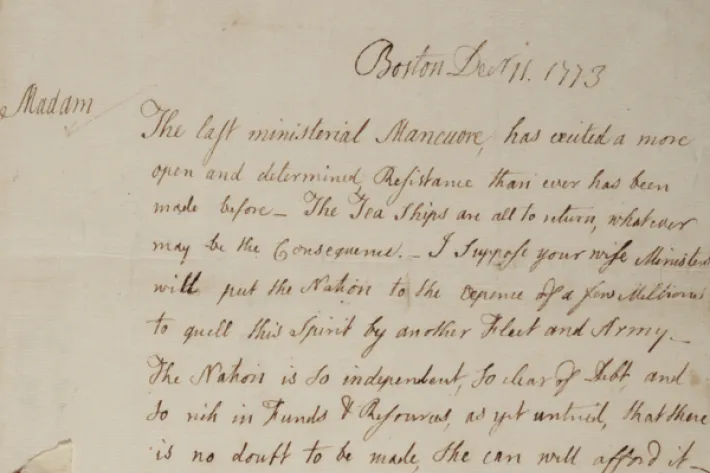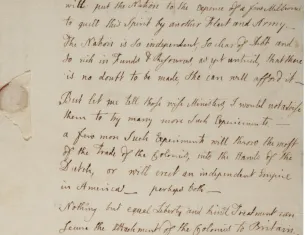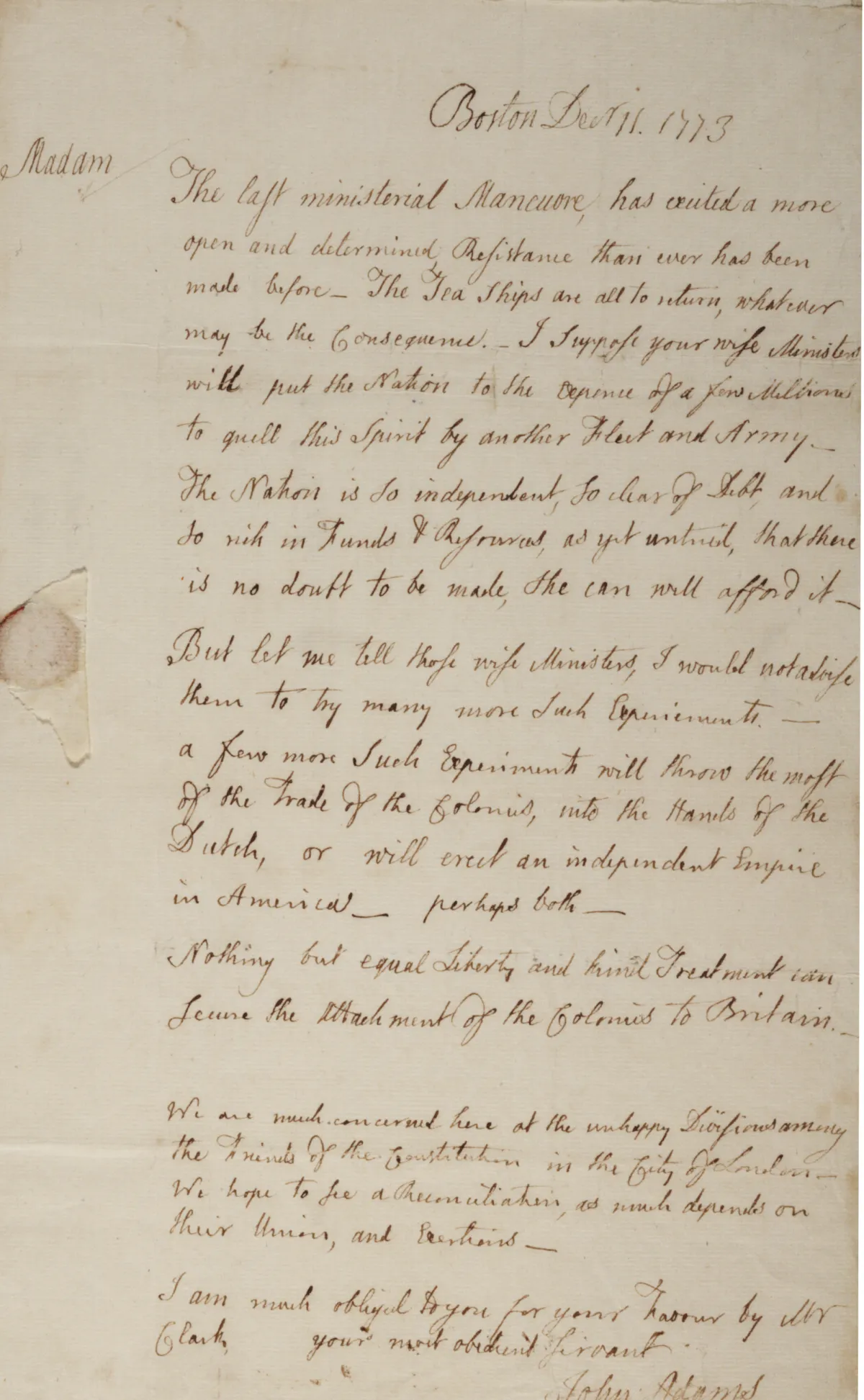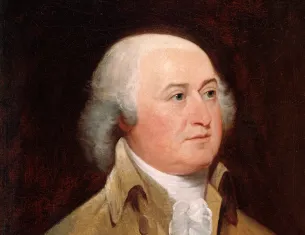John Adams to Catharine Macaulay on the Tea Act, 1773

John Adams to Catharine Macaulay, December 11, 1773. (The Gilder Lehrman Institute of American History, GLC01787)
A few days before the Boston Tea Party, John Adams wrote to Catharine Macaulay, an English historian, author, and women’s rights advocate. Macaulay was well known on both sides of the Atlantic and corresponded with both John and Abigail Adams. In this letter, written on December 11, 1773, when no one knew what would happen with the tea ships sitting in Boston harbor, Adams predicts a breach between America and Britain.
A Letter from John Adams to Catharine Macaulay, December 11, 1773
Boston Decr. 11. 1773
Madam
The last ministerial Mancuore, has excited a more open and determined Resistance than ever has been made before – The Tea Ships are all to return, whatever may be the Consequence. – I Suppose your wise Ministers will put the Nation to the Defence of a few Millions to quell this Spirit by another Fleet and Army – The Nation is so independent, so clear of Debt and so rich in Funds & Resources, as yet untried, that there is no doubt to be made, She can well afford it – But let me tell those wise Ministers, I would not advise them to try many more such Experiments. – a few more such Experiments will throw the most of the Trade of the Colonies, into the Hands of the Dutch, or will erect an independent Empire in America – perhaps both –
Nothing but equal Liberty and kind Treatment can Secure the attachment of the Colonies to Britain. –
We are much concerned here at the unhappy Divisions among the Friends of the Constitution in the City of London – We hope to see a Reconciliation, as much depends on their Union, and Exertions –
I am much obliged to you for your Favour by Mr Clark
John Adams
Source: John Adams to Catharine Macaulay, December 11, 1773, The Gilder Lehrman Institute of American History, GLC01787.
A Letter from John Adams to Catharine Macaulay, December 11, 1773
Boston Decr. 11. 1773
Madam
The last ministerial Mancuore, has excited a more open and determined Resistance than ever has been made before – The Tea Ships are all to return, whatever may be the Consequence. – I Suppose your wise Ministers will put the Nation to the Defence of a few Millions to quell this Spirit by another Fleet and Army – The Nation is so independent, so clear of Debt and so rich in Funds & Resources, as yet untried, that there is no doubt to be made, She can well afford it – But let me tell those wise Ministers, I would not advise them to try many more such Experiments. – a few more such Experiments will throw the most of the Trade of the Colonies, into the Hands of the Dutch, or will erect an independent Empire in America – perhaps both –
Nothing but equal Liberty and kind Treatment can Secure the attachment of the Colonies to Britain. –
We are much concerned here at the unhappy Divisions among the Friends of the Constitution in the City of London – We hope to see a Reconciliation, as much depends on their Union, and Exertions –
I am much obliged to you for your Favour by Mr Clark,
your most obedient Servant
John Adams
Source: John Adams to Catharine Macaulay, December 11, 1773, The Gilder Lehrman Institute of American History, GLC01787.
Background
A few days before the Boston Tea Party, John Adams wrote to Catharine Macaulay, an English historian, author, and women’s rights advocate. Macaulay was well known on both sides of the Atlantic and corresponded with both John and Abigail Adams. In this letter, written on December 11, 1773, when no one knew what would happen with the tea ships sitting in Boston harbor, Adams predicts a breach between America and Britain.
Transcript
A Letter from John Adams to Catharine Macaulay, December 11, 1773
Boston Decr. 11. 1773
Madam
The last ministerial Mancuore, has excited a more open and determined Resistance than ever has been made before – The Tea Ships are all to return, whatever may be the Consequence. – I Suppose your wise Ministers will put the Nation to the Defence of a few Millions to quell this Spirit by another Fleet and Army – The Nation is so independent, so clear of Debt and so rich in Funds & Resources, as yet untried, that there is no doubt to be made, She can well afford it – But let me tell those wise Ministers, I would not advise them to try many more such Experiments. – a few more such Experiments will throw the most of the Trade of the Colonies, into the Hands of the Dutch, or will erect an independent Empire in America – perhaps both –
Nothing but equal Liberty and kind Treatment can Secure the attachment of the Colonies to Britain. –
We are much concerned here at the unhappy Divisions among the Friends of the Constitution in the City of London – We hope to see a Reconciliation, as much depends on their Union, and Exertions –
I am much obliged to you for your Favour by Mr Clark
John Adams
Source: John Adams to Catharine Macaulay, December 11, 1773, The Gilder Lehrman Institute of American History, GLC01787.
Excerpt
A Letter from John Adams to Catharine Macaulay, December 11, 1773
Boston Decr. 11. 1773
Madam
The last ministerial Mancuore, has excited a more open and determined Resistance than ever has been made before – The Tea Ships are all to return, whatever may be the Consequence. – I Suppose your wise Ministers will put the Nation to the Defence of a few Millions to quell this Spirit by another Fleet and Army – The Nation is so independent, so clear of Debt and so rich in Funds & Resources, as yet untried, that there is no doubt to be made, She can well afford it – But let me tell those wise Ministers, I would not advise them to try many more such Experiments. – a few more such Experiments will throw the most of the Trade of the Colonies, into the Hands of the Dutch, or will erect an independent Empire in America – perhaps both –
Nothing but equal Liberty and kind Treatment can Secure the attachment of the Colonies to Britain. –
We are much concerned here at the unhappy Divisions among the Friends of the Constitution in the City of London – We hope to see a Reconciliation, as much depends on their Union, and Exertions –
I am much obliged to you for your Favour by Mr Clark,
your most obedient Servant
John Adams
Source: John Adams to Catharine Macaulay, December 11, 1773, The Gilder Lehrman Institute of American History, GLC01787.


